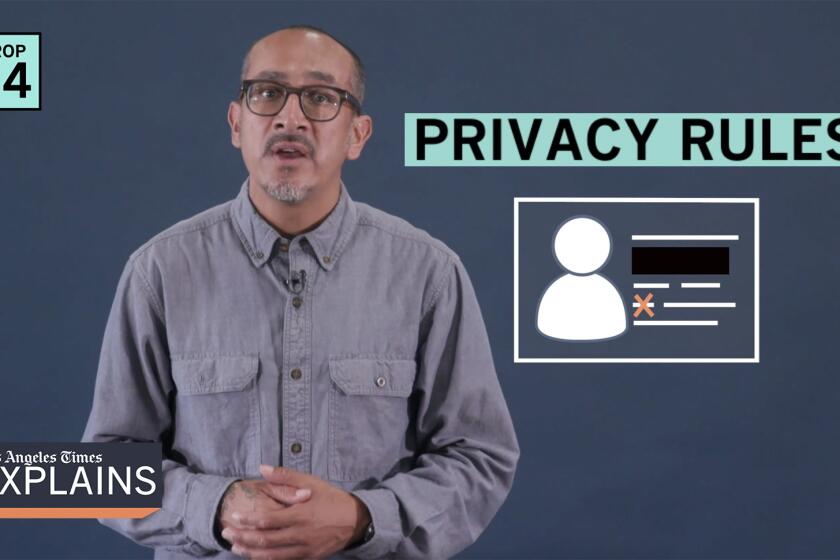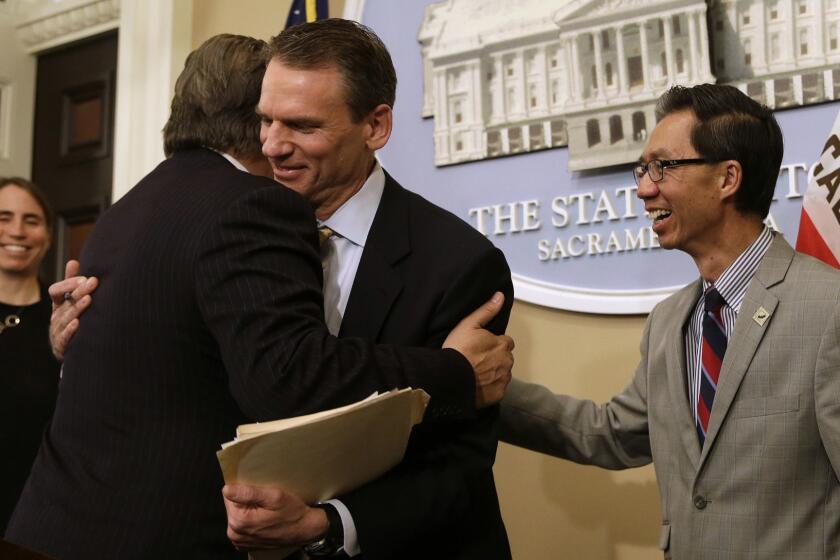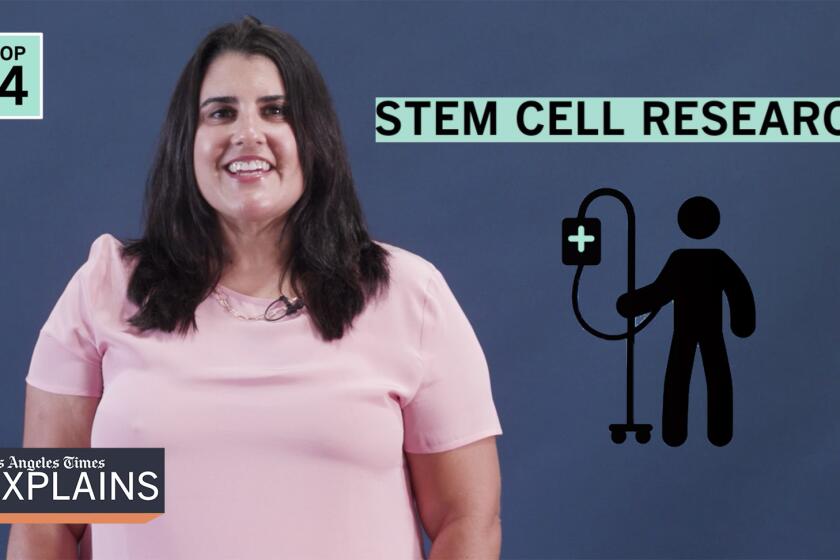Column: Prop. 24 is an easy ‘yes’ to protect internet privacy in California. But I’m a ‘no’ on Prop. 14

- Share via
SACRAMENTO — Proposition 24 is the most obscure, complex measure on Tuesday’s state ballot. But it affects practically every Californian and really is quite simple.
Bottom line: It would attempt to protect your privacy from the internet monster that profits off people’s personal data.
For the record:
12:05 p.m. Oct. 29, 2020An earlier version of this story said the Proposition 14 spokeswoman was Sarah Melbostad. The Proposition 14 spokeswoman is
Kendall Klingler.
And there’s another low-profile measure on the ballot. It’s Proposition 14, which seeks to borrow billions — $5.5 billion in principal plus $2.3 billion in interest — to continue state funding for stem cell research.
Voters kicked in $3 billion plus interest — estimated at around $1 billion — to create the California Institute of Regenerative Medicine in 2004. Now the well is about empty and it’s asking for a recharge.
That’s a ton of money for a little-noticed agency that provides a questionable state service. But many of the research projects have been very worthwhile. More on Proposition 14 later.
Proposition 24 tries to control the nosy internet elves who capture your personal information and peddle it to businesses so they can target you with online ads, among other things.
If voters approve Proposition 24 and the measure succeeds in helping corral the internet, it will become a model for the nation, predicts its author and bankroller, Bay Area real estate developer Alastair Mactaggart.
“If California does this now, then the United States will have privacy one way or the other,” Mactaggart says. “States will act, or the federal government will. Either way, we’ll eventually have good privacy for the country….
“The same way that California led the country in cleaning polluted air.”
Mactaggart became alarmed about the internet’s threat to personal privacy three years ago at a cocktail party. He was gabbing with a Google engineer.
If Proposition 24 passes, it would make changes to California’s new consumer privacy law, allowing consumers new rights to limit the sharing of their personal information.
“I asked, ‘What’s this deal with all the privacy stuff? Is it anything to be worried about?’” Mactaggart recalls. “I expected him to say, ‘No, it’s not a big deal.’
“Instead he said, ‘If people only knew how much we know about them, they’d really freak out.’
“I was taken aback.”
He learned that personal data gleaned by the internet are used to market TV sets, cars, shoes — practically everything. Internet users are targeted with ads based on their hobbies, age, children, residence, location, gender and sexual orientation.
Mactaggart created a ballot initiative to regulate internet data collecting. Then it was the internet companies’ turn to freak out: They threatened to spend tens of millions fighting the measure.
The ballot measure is intended to strengthen California’s landmark data privacy law — so why are privacy groups against it?
The two sides agreed to take advantage of a new reform that allowed an initiative sponsor to negotiate a legislative compromise and drop the ballot measure. The result was passage of the nation’s toughest internet privacy bill, which took effect last year.
The new law gave Californians the right to know what personal information was being collected, the right to have it deleted and the right to tell companies not to sell it.
But the tech gurus found all kinds of loopholes. Some sites claim they’re not selling personal information, just “sharing” it with partners. The law apparently doesn’t forbid that.
Anyway, California Atty. Gen. Xavier Becerra says he’s too swamped with other chores — such as suing President Trump — to aggressively enforce the new state law.
Smelling blood, internet interests began trying to pick apart the law in the Legislature. They tried to exempt vehicle ownership and insurance coverage data, for example. Mactaggart lobbied against them and they were unsuccessful. But he was alarmed again.
“I told myself I can’t do this the rest of my life,” he says. “This isn’t going to work.”
So, he and state Sen. Bob Hertzberg (D-Van Nuys), who helped craft the original compromise, wrote Proposition 24.
If Proposition 14 passes, it would allow the state to borrow more money to continue stem cell research at the state government level.
The ballot measure would close many of the loopholes and erect a protective wall. The Legislature could amend it only to “further the purpose and intent of this Act.” So it could be strengthened but not weakened.
A separate agency would be created with a $10-million annual budget to enforce the law.
It would allow consumers to order internet companies not to sell or “share” their data.
Certain “sensitive personal information” couldn’t be collected, such as data on race, health, religion, sexual orientation and precise location.
“Amazon doesn’t need to know you’re at church,” Mactaggart says.
Let alone which church.
He’s the sole campaign bankroller, anteing $5 million. The tech industry has backed off and isn’t spending a dime.
There are some opponents, such as the American Civil Liberties Union, that think the measure isn’t strong enough. But that’s political reality — and why it’s likely to pass.
Proposition 24 is an easy “yes.”
A closer call is Proposition 14.
Proposition 14 asks voters to approve $5.5 billion in general obligation bonds for the California Institute for Regenerative Medicine, known as CIRM, for stem cell research.
In 2004, a primary motivation behind lopsided voter approval of a $3-billion stem cell bond issue was that President George W. Bush banned federal funding for embryonic stem cell research on religious grounds. But President Obama removed the ban and President Trump never restored it.
Federal funding is available now for embryonic stem cell research. And private interests are kicking in lots more. So, is state money still needed?
“If we don’t continue the state funding, lots of facilities would have to close their doors,” says Kendall Klingler, the Proposition 14 spokeswoman.
These are top-of-the-line research facilities built with state bond money and partially supported with state funds.
“We have more than 90 stem cell trials underway,” she says.
The agency does have a record of some success: funding research that has led to treatments approved by the Food and Drug Administration for blood and bone marrow cancers, for example.
But the agency failed to live up to its original hype.
It was aloof to Sacramento, and not subject to oversight by the Legislature and governor. There’s been a lack of transparency.
There was also an odor of interest conflicts among agency board members who seemed to steer grants toward their own institutions, even though they recused themselves from voting.
The new bonds would cost an estimated $260 million annually for 30 years. And the old bonds still won’t be paid off for many years.
The state currently has higher spending priorities.
Proposition 14 is a “no” for now. Maybe check back at the next election cycle.
More to Read
Sign up for Essential California
The most important California stories and recommendations in your inbox every morning.
You may occasionally receive promotional content from the Los Angeles Times.















